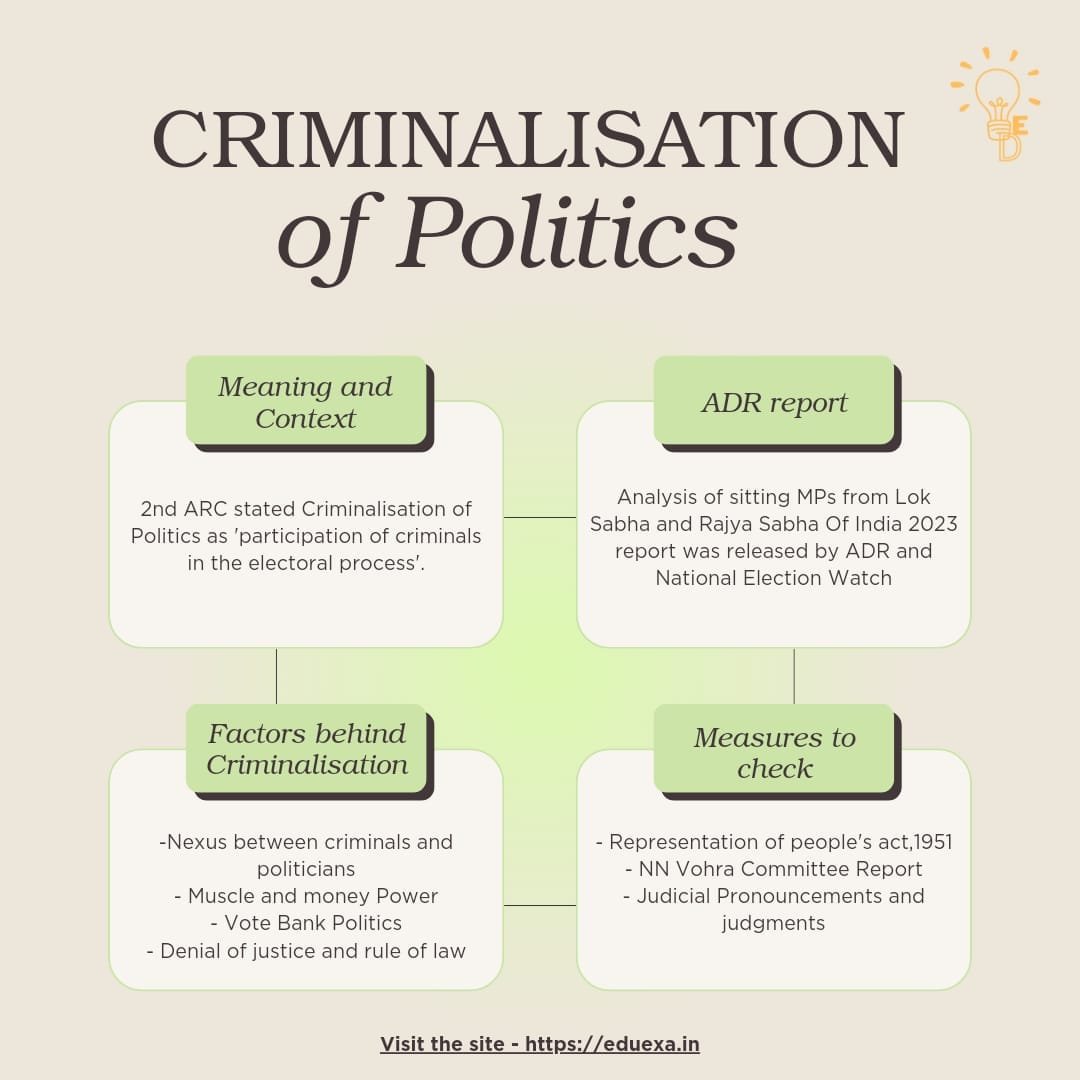Criminalisation of Politics: A Comprehensive Guide in 2024
Recent Context
Recently released a report titled ‘Analysis of Sitting MPs from Lok Sabha and Rajya Sabha of India 2023’ was released
About the Report
It was released by the Association for Democratic Reforms (ADR) and National Election Watch.
Key Findings
- Sitting MPs with criminal cases: 40% of Sitting MPs have declared criminal cases against themselves. Sitting MPs with serious criminal cases: 25% of Sitting MPs have declared serious criminal cases including cases related to murder, attempt to murder, etc.
- State with Highest Percentage of Sitting MPs with Criminal Cases: Highest Percentage of Sitting MPs with Criminal Cases in State/UTs: Lakshadweep followed by Kerala and Bihar respectively.
About ADR – It was established in 1999 by a group of professors from the Indian Institute of Management (IIM) Ahmedabad Its goal is to improve governance and strengthen democracy by continuous work in the area of Electoral and Political Reforms.
What do you mean by Criminalisation of Politics?
Criminalisation of politics is defined as the situation when criminals (Engaged in crimes or have active cases) participate in the politics of the government, i.e., contest elections and get elected to the Parliament and state legislatures.
Reasons for Criminalisation of Politics
There are various factors which causes Criminalisation of Politics.
Nexus :- Nexus between the criminal gangs, police, bureaucracy and politicians result in non-addressing of Criminalisation of Politics.
Vote Bank Politics:- It has been observed that chances of winning an election after serving a jail term is higher because of people’s sympathy and lack of awareness.
Lack of Regulations:- Representation of people’s act, 1951 and other provisions disqualifies candidates (who have served a minimum of 2 years imprisonment) only for Six years.
Money Power:- Black money and mafia funds contribute significantly to the Criminalisation of Politics. These illegal sources of money are used to buy votes and win elections, leading to a rise in criminalisation in politics
Muscle Power :- Criminals are used by political parties and independent candidates to spend enormous sums of money on vote buying and other illegal activities.
Improper administration and rule of Law:- Improper administration, unlimited government, poor implementation of rule of law and denial of justice are other reasons.
Parochial Factors :- Voters often vote on the basis of parochial factors such as on the basis of caste, community etc. which leads to victory of a person with a criminal record.
Lack of awareness among voters :- Voters are either unaware about the background of the politicians or are swayed by corrupt and false promises made by those candidates.
Judicial pendency:– High level of pendency in courts also affects the disposal of cases.
What is UR full form and difference between UR Category and General Category? Read Here.
Impact of Criminalization of Politics
Institutionalised corruption and trust erosion: Corruption thrives when the rule of law is disregarded and paired with the criminality of politics. India ranked 85th out of 180 countries, according to the 2022 Corruption Perceptions Index report by Transparency International. Also, when politicians with criminal backgrounds hold public office, it can erode public trust in the political system.
Criminalization of Political Parties: This is because the criminal elements can gain control of political parties and using them for their benefit. Inner-party democracy also gets adversely impacted. Affects working of investigation and prosecution agencies: Nexus between criminal-politicians has the tendency to influence the working of agencies.
Impacts democracy: Criminalisation of politics suggests poor rule of law which further affects freedom of speech for people, thus, impacting democracy.
Affects conducting of free and fair elections: Due to the use of money and muscle power in elections by criminals the elections are not conducted in a free and a fair manner. The Centre for Media Studies reported that around $8 billion was spent during 2019 Lok Sabha general elections.
Burden of exchequer: With further reimposition of criminals and corrupt people in the higher position, they can use the public resources and privileges for their own benefit rather than public good.
Measures to check Criminalization of Politics
Legislative Measures: Section 8(3) of the Representation of People Act, 1951 says any lawmaker sentenced to at least two years in jail remains disqualified for six years upon their release.
Constitutional Measures: Disqualification is enabled by Article 102 (1) of the Constitution of India, which says a lawmaker can be disqualified under any law enacted by the Parliament. Similar provision exists for the states under Article 191(1).
Judicial pronouncement:
Union of India vs. Association for Democratic Reforms (2002): SC stated that electors have a fundamental right to know the antecedents of candidates. It states ‘right to be informed’ as a right flowing from freedom of speech and expression.
People’s Union for Civil Liberties (PUCL) v Union of India (2004): SC declared Section 33B of Representation of Peoples Act 1951 as unconstitutional and void. The section allowed candidates to furnish information only under the Act.
Lily Thomas v Union of India (2013): SC ruled that Section 8(4) of the Representation of People Act (1951) as unconstitutional. Section 8(4) of the RP Act earlier allowed convicted MPs, MLAs and MLCs to continue in their posts, provided they appealed against their conviction/sentence in higher courts within three months of the date of judgement by the trial court.
Public Interest Foundation v. Union of India (2018): SC ordered political parties to publish the criminal records of their candidates on their websites, social media handles, and newspapers.
Rambabu Singh Thakur v Sunil Arora (2020): SC re-iterated the Court’s 2018 directions and directed the Election Commission to report to the Supreme Court any non-compliance by political parties.
Committees to suggest Reforms:-
Various committees from time to time are being formed to suggest Reforms in electoral process. Some of the committee and commisions are :-
- N.N Vohra Committee
- Second ARC
- National Commission to Review the working of Constitution
- Sarkaria Committee
Way forward
Lifetime ban for convicts from polls: Election Commission of India had mentioned it in the electoral reform proposals published by it in 2004 and 2016.
Hybrid electoral System: As suggested by 170th Law Commission Report on the hybrid system i.e., 75% through firg past the post (FPTP) and 25% through proportional system. As per experts, FPTP encourages candidates to spend a humongous amount in every election.
Punishment for filing of false affidavits: The Law Commission in its 244th Report titled ‘Electoral Disqualification suggested punishment should be enhanced to a minimum 2 years imprisonment and such an offence must also be made a ground for disqualification.
Internal democracy for political parties: The National Commission to Review the Working of the Constitution (NCRWC) Report suggested a dedicated legislation for inner-party democracy.
Amending the Representation of The People Act, 1950: To debar the persons from contesting elections against whom heinous nature crimes are pending.
Other Reforms: Right to recall, State funding of elections, Fast tracking judicial process, etc. for improving the election ecosystem of India.




Pingback: AI WASHING: ARTIFICIAL INTELLIGENCE AND ITS CONCERN